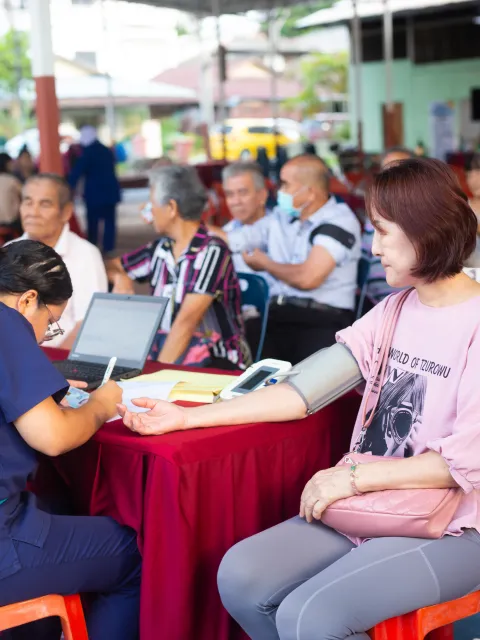WCRF International emphasises the role of policymakers in improving cancer prevention in new blueprint
World Cancer Research Fund (WCRF) International, a UICC member and partner, has launched a new policy blueprint highlighting effective policies to reduce exposure to key cancer risk factors, restrict the availability of unhealthy products, and create healthier environments.

HIGHLIGHTS
- WCRF International's blueprint underscores the urgency of acting on modifiable risk factors to curb the rising incidence of cancer, with cases projected to increase from 20 million in 2022 to 35 million annually by 2050.
- It focuses on four key cancer risks: healthy diet and weight, breastfeeding, physical activity and alcohol, and highlights the role of governments in creating environments that support healthy choices, rather than placing the onus on individuals.
- Key recommendations include marketing restrictions, fiscal and legal policies, designing healthy and safe schools, and promoting healthy urban and built environments.
- The blueprint also addresses the challenges posed by commercial interests that place profits before public health and calls for strong advocacy and policy design to safeguard public health policies from undue commercial influence.
World Cancer Research Fund (WCRF) International’s new comprehensive blueprint joins the dots between the science around cancer risk – as summarised by WCRF’s Cancer Prevention Recommendations – and a set of integrated policies that should be prioritised to minimise these cancer risks for populations.
It is an essential guide for policymakers and advocates, aimed at enhancing cancer prevention efforts globally, and focusing on key cancer risks related to healthy diet and weight, breastfeeding, physical activity and alcohol.
“The blueprint, developed with input from experts and stakeholders, underscores the urgency of acting on modifiable risk factors to curb the rising incidence of cancer. Cancer cases projected to increase from 20 million in 2022 to 35 million annually by 2050, primarily in low-resource settings. The resulting costs associated with cancer treatment and care are rising at an unsustainable rate, and the need for cost-effective prevention measures has never been more pressing.”
– Ioana Vlad, Senior Policy Research Manager at WCRF International
The blueprint reiterates the role of governments in creating environments that support healthy choices. “Our policy work is predicated on the principle that people's behaviours are heavily influenced by the environments where they live,” Vlad stated. “Policy interventions should target these environments rather than placing the onus on individuals.”
The policy blueprint outlines several key recommendations to promote healthy diets and weight, support breastfeeding, increase physical activity, and reduce alcohol consumption. These include marketing restrictions, fiscal and legal policies, designing healthy and safe schools, promoting healthy urban and built environments, and procurement, planning, and incentives in communities, among others.
The blueprint highlights the importance of introducing taxes on unhealthy products such as sugary drinks and foods and providing subsidies for healthy foods. Policies such as front-of-pack nutrition labelling in Latin America and the UK’s sugar tax have led to improved public health outcomes and significant reductions in sugar consumption. “Governments can and must do more to promote access to nutritious and healthy foods,” says Vlad.
One specific area where this is the case is in schools. “Creating healthy and safe school environments is crucial for instilling healthy habits in children from a young age,” Vlad emphasised. “This includes setting high-quality nutrition standards for meals and snacks, and ensuring these are appropriately enforced and monitored.”
The policy blueprint also address the challenges posed by commercial interests that place profits before public health. “We need to safeguard policy design and implementation from undue influence by unhealthy commodity industries like unhealthy foods, alcohol, and fossil fuels," Vlad says.
Strictly regulating the marketing of unhealthy foods and beverages, particularly those targeting children and vulnerable populations, aligns with UICC's call for policies that protect individuals from harmful commercial influences and promote health equity. “Governments must engage with industry when necessary but without extending their role to policy development.”
It calls for strong advocacy and policy design to ensure that public health policies are safeguarded from undue commercial influence. “We need to apply lessons learned from successful tobacco control policies to alcohol and unhealthy food industries,” Vlad suggested. “The advocacy community can learn from one another and work together to overcome these challenges.”
The blueprint also shows the broader benefits of cancer prevention policies, which go beyond reducing cancer risk. These measures can enhance overall public health, lower healthcare costs, and support climate and sustainability goals.
For instance, designing urban spaces that encourage physical activity and healthy living. This involves creating walkable neighbourhoods, expanding access to green spaces, and enhancing active transport options such as cycling and public transport. Another measure is promoting plant-based diets, which not only reduces cancer risk but also cuts greenhouse gas emissions.
Finally, the blueprint calls for policies that address health inequities and support vulnerable communities. “We clearly advise governments to take a two-pronged approach to inequities,” says Vlad. “Universal social protection programmes on the one hand, and at the same time looking at context-specific national data, identifying vulnerable communities, and developing programmes that target these communities in particular.”
Investing in prevention is the best policy for improving public health and reducing costs of ill health. The knowledge of cancer and the ability to screen cancer, detect early, and treat effectively have improved dramatically in the past decade. However, as cases increase, costs for society and health systems rise significantly.
The WCRF International policy blueprint is a comprehensive and evidence-based guide for policymakers and advocates working to reduce the risks of developing cancer and related costs through prevention.
“Cancer prevention is closely linked to the prevention of other non-communicable diseases. We aimed to initiate a discussion on the wider impact of these policies, particularly their connections to climate and sustainability objectives.”
– Ioana Vlad, Senior Policy Research Manager at WCRF International
Last update
Friday 14 February 2025
